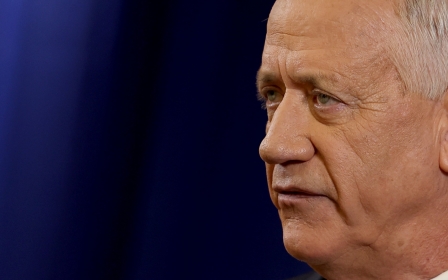War on Gaza: Israel's army spokesman says Hamas cannot be eliminated

The Israeli military's chief spokesperson has said that anyone who thinks Hamas can be eliminated is "wrong", in the latest public comment highlighting a growing rift between Israel's military and political leadership over the ongoing war on Gaza.
In an interview with Israeli Channel 13, Daniel Hagari said Hamas "was an idea, a party", that is "rooted in the hearts of the people".
"Anyone who thinks we can eliminate Hamas is wrong," he said, adding that the war's aim of destroying the Palestinian armed group was "throwing sand in the eyes of the people".
Israeli Prime Minister Benjamin Netanyahu has for months repeated that the war, which has killed over 37,000 Palestinians, is aimed at eliminating Hamas.
Netanyahu was quick to rebuff Hagari's comments, with his office saying the destruction of Hamas was one of the security cabinet's war goals, and that the military were "obligated" to execute it.
New MEE newsletter: Jerusalem Dispatch
Sign up to get the latest insights and analysis on Israel-Palestine, alongside Turkey Unpacked and other MEE newsletters
Responding to Netanyahu, the Israeli military released a statement affirming that "the army is committed to achieving the war's goals as defined by the cabinet."
'Anyone who thinks we can eliminate Hamas is wrong'
- Daniel Hagari, Israeli military spokesperson
During the interview, Hagari appeared to criticise the Israeli government's overall strategy in confronting Hamas.
He warned that if the government did not find a political alternative to the group in the Gaza Strip, then it would remain there.
"What can be done is to develop something else to replace it. Something that will make the population realise that someone else is distributing the food, someone else is taking care of public services… to really weaken Hamas, this is the way," Hagari said.
He added that returning all captives through military operations was "impossible" and that this would have to be achieved through other means.
Growing rift over war's future
Hagari's comments came amid ever-growing tensions between Netanyahu and military officials over the prime minister's handling of the war on Gaza, as a week of anti-government protests demanding a deal to secure the release of captives continues across Israel.
Last month, Israeli Defence Minister Yoav Gallant publicly called out Netanyahu for not having a clear plan for "post-war governance" in the Gaza Strip.
He said he did not support open-ended Israeli military rule over the Palestinian territory and urged the prime minister to present a local alternative, an option Netanyahu has so far avoided.
Last week, the Israeli military's chief of staff, Herzi Halevi, was reportedly behind media leaks criticising the government for a lack of political solutions to end the war.
Netanyahu rebuffed pressure from the military, taking a jab at the leaks by saying: "Israel is a state with an army, not an army with a state."
Earlier this month, former Israeli war cabinet member Benny Gantz resigned over the absence of a "post-war" plan for Gaza. His announcement followed an ultimatum he handed to Netanyahu last month calling on him to lay out a new plan for the war on Gaza by 8 June.
His decision was applauded by Israel’s opposition leader Yair Lapid, who called the move “important and correct".
Former top general and war cabinet minister Gadi Eisenkot, an ally of Gantz, said earlier this month that "anyone promising that 'we'll deal with the battalions in Rafah and then bring back the hostages' is sowing a baseless illusion."
A recent poll by the Institute for National Security Studies (INSS) revealed that only 12 percent of Israelis believe the government would achieve its military goals in Gaza, while 67 percent said they would defeat Hezbollah, down from 91 percent immediately after the outbreak of the war on 7 October.
The United States has repeatedly called on Netanyahu to present a post-war plan for Gaza. Last month, US President Joe Biden said that there was "every reason" for people to believe Netanyahu was prolonging the conflict for political reasons.
Middle East Eye delivers independent and unrivalled coverage and analysis of the Middle East, North Africa and beyond. To learn more about republishing this content and the associated fees, please fill out this form. More about MEE can be found here.





